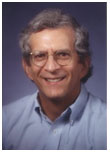Director's Biography
Richard J. Hodes, M.D.
NIA Director
|
Name: Richard J. Hodes, M.D.
Position: Director, National Institute on Aging
Birthplace: New York
Date: December 31, 1943
Education: B.A., Yale University, 1965 M.D., Harvard Medical School, 1971 |

|
Experience: Dr. Richard J. Hodes, an eminent immunologist, directs the research program of the National Institute on Aging (NIA) at the National Institutes of Health (NIH). The NIA is the principal Federal funding agency for studies of the basic, clinical, epidemiological, and social aspects of aging. By promoting the continued development of a strong, diverse, and balanced research program at NIA, Dr. Hodes expects to fuel progress in aging research.
He maintains an active involvement in research on the NIH campus in Bethesda, Maryland, through his direction of the Immune Regulation Section, a laboratory devoted to studying regulation of the immune system, focused on cellular and molecular events that activate the immune response. This involvement in campus research also serves to strengthen ties with other NIH scientists involved in studies of age-related diseases.
Dr. Hodes was named Director of the NIA in 1993, but has enjoyed a long career in science at NIH – first as a clinical investigator in the National Cancer Institute, then as the Deputy Chief and Acting Chief of the Cancer Institute's Immunology Branch. Since 1982 he has served as Program Coordinator for the U.S.-Japan Cooperative Cancer Research Program, and since 1992 on the scientific advisory board of the Cancer Research Institute.
He is a Diplomate of the American Board of Internal Medicine. In 1995 Dr. Hodes was elected as a member of The Dana Alliance for Brain Initiatives; in 1997 he was elected as a Fellow of the American Association for the Advancement of Science; and, in 1999 he was elected to membership in the Institute of Medicine of the National Academy of Sciences.
Dr. Hodes is a graduate of Yale University. He received his M.D. from Harvard Medical School. As author of more than 200 research papers, he is an influential scientist in and contributor to the field of immunology.
Page last updated Sep 26, 2008
